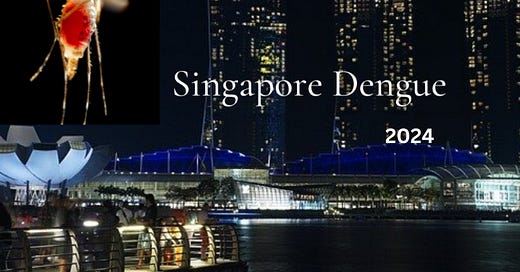Singapore’s National Environment Agency (NEA) reported a 114 percent increase in dengue fever cases during the first quarter of 2024.
From January 1 through March 28 this year (the first 13 weeks of the year), officials report 5,039 total cases, compared to the 2,360 cases reported in the same period last year.
The weekly number of reported dengue cases has remained high, at above 300, since the start of 2024. The Aedes aegypti mosquito population has also remained high, with the number of Aedes mosquito breeding habitats found at residential premises in January 2024 double that of January 2023.
Our population in Singapore has low immunity to all four Dengue virus serotypes too (four Dengue virus serotypes circulating in Singapore. Dengue virus serotype 2 (DENV-2) has been predominant since September 2023, with prior periodic dominance of DENV-1 and DENV-3 in 2023), NEA officials note. The continued presence of all these dengue risk factors may lead to a surge in dengue cases in the coming months, if insufficient action is taken.
As of Mar 25, seven people have died from local dengue infection. Six fatalities were recorded for the whole of 2023.
In 2023, a dengue outbreak was averted in Singapore as just less then 10,000 cases were reported throughout the year, a significant drop from 2022 when 32,173 cases were reported.
Subscribe to Outbreak News TV on YouTube
Stepped-up prevention and control measures taken last year to prevent a dengue outbreak include: continued community efforts in removing stagnant water, intensified vector control measures, as well as increased public communications and outreach efforts.
NEA’s Project Wolbachia has also seen positive results across study sites: Aedes aegypti mosquito populations in the existing study sites of Bukit Batok, Choa Chu Kang, Tampines and Yishun have generally fallen by more than 90 per cent. Data from 2019 to 2022 indicates that residents living in areas with at least one year of releases were up to 77 per cent less likely to be infected with dengue.





